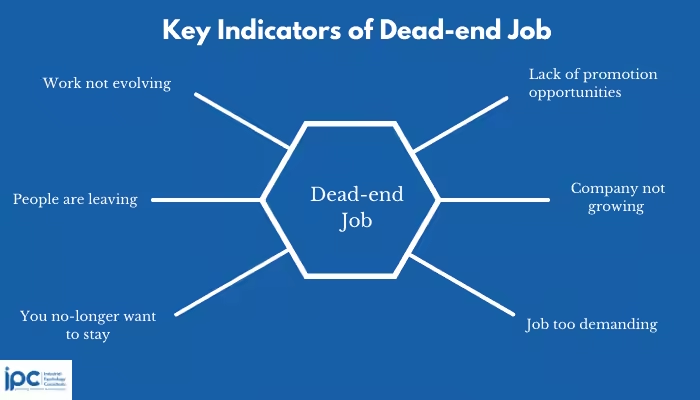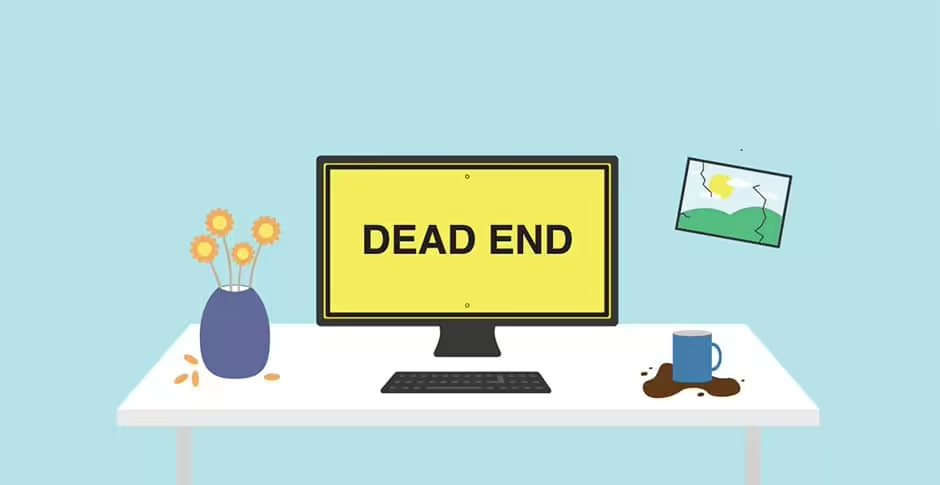Feeling stuck at a job happens to a lot of people. If you are feeling like you are working a dead-end job at your current company, the first thing you need to know is you are not alone. Not everyone finds their dream job right away; some have to work two or more jobs until they feel they have finally found “the one.” We all want to find that job that makes us happy to get out of bed in the morning.
What is a dead-end job?
Dead-end jobs are defined as jobs with relatively small career prospects (Bygren & Kumlin 2004). Dead-end positions lack career opportunities in terms of wage increments and chances of promotions. Typical features of a dead-end job may include a low degree of problems concerning monitoring, where the quantity and quality of the work are easily assessed, as well as small requirements of specific human capital.
Ultimately, a dead-end job is defined by your happiness, your satisfaction, and the sense that you are meeting your goals. Any position is likely to leave you frustrated and unsatisfied once in a while, but if it’s happening day in and day out and getting worse rather than better, there’s a problem. That problem will not go away by itself: you need to do something about it.
Related: 15 Dead-end jobs to avoid
The key indicators of a dead-end job

1. Your work is not evolving
As you gain more experience in your current position, you should be able to expect that you will be given more responsibility and increasingly challenging work. And as you complete each new assignment and prove yourself time and time again, you should eventually start seeing opportunities to move up in a more official sense.
On the other hand, if you are still doing the same work today as you did two years ago when you first started working for your current employer, that is a pretty straightforward sign that you’re not going to be moving up very quickly—or at all. And without the chance to improve your skills and develop new ones, even if you did have the chance at a higher position, you may not have the marketable skills to fill it. In short: without new opportunities, your career is at a standstill.
Related: How to react after not getting a promotion
2. It would take a miracle for a Promotion
For a clear sign that your career might be stalled, look to your superiors and their tenure with the company. For example, the boss has been in her position for five years, and her boss has been in his position for seven—and they both seem very comfortable where they are. That means, for you to move up, something would have to entice one of those big wigs out of his or her position. And you have seen no indication that anyone is planning on leaving anytime soon.
3. You see people leave
Often for the same reasons. What’s even worse is the company takes no notice of it. It is a red flag that the company does not care and they are not willing to change the faulty work environment for their people to stay.
Related: How to create an inclusive work environment
4. Company’s Growth Is Slowing Down
If a corporation’s revenues have stalled, there are often fewer opportunities for employers to see growth in their careers. It may be time to expand your horizons if you see the company going downhill for more than a couple of years as there will be a lack of opportunities.
We all experience a lack of motivation at work every once in a while. We are humans – it’s in our nature to get sick of something repetitive, complain about it with a burning passion, and seek excitement.
But if your motivation has been declining for months now, despite having done everything to turn things around, then maybe it’s time to move out and preserve your career growth.
5. Your job is too demanding
Careers are hard work. Good bosses recognize that and they try to minimize the workload by making sure you get home before sundown and you take your mind off work during weekends. But if you are expected to report for work on Saturdays or answer calls while on your lunch break, and you are not being properly compensated, chances are that you are not being valued.
6. Even if an opportunity came you would not want it
Okay, an opportunity to get a promotion arose. However, when you think about your current level of satisfaction and career goals for the future, the idea of promotion or staying longer in that company sends shivers down your spine.
You are not passionate about the company’s mission. You don’t see yourself doing these things forever because you are in a dead-end job.
We all experience a lack of motivation at work every once in a while. We are humans – it’s in our nature to get sick of something repetitive, complain about it with a burning passion, and seek excitement.
But if your motivation has been declining for months now, despite having done everything to turn things around, then maybe it’s time to move out.
7. Even if an opportunity came you would not want it
Okay, an opportunity to get a promotion arose. However, when you think about your current level of satisfaction and career goals for the future, the idea of promotion or staying longer in that company sends shivers down your spine.
You are not passionate about the company’s mission. You don’t see yourself doing these things forever because you are in a dead-end position.
All of us desire to level up. We work to gain a more senior position, acquire a new set of skills, master additional responsibilities, and get paid higher. And if you are stuck in a dead-end job, you are being deprived of these amazing opportunities.
What to do when stuck in a dead-end job

A resignation and starting a job hunt may seem like the obvious way out of a dead-end job, and it may eventually be necessary, but it should not be your first step. You owe it to yourself and your employer to take your best shot at fixing things before you decide to move on.
First, take a close, critical look at yourself and the way you approach work. Sometimes we make our ruts, and sometimes a situation offers possibilities that we do not see. Review the work you are doing and the work going on around you and look closely for opportunities to stand out, get noticed, and get ahead.
There may be none, but it’s still worth looking at. If you have trusted friends who are familiar with your situation, ask for feedback on anything you might do to open doors or create opportunities in your current position. If you are seriously worried about your future in your job, likely, you have already been through this process, but it’s always worth repeating it.
If you still do not see a way out, it’s time for a serious talk with your boss. You do not want to sound critical or overly self-centered, but there’s nothing wrong with expressing concern for your future and a desire to offer more to your employer.
The way your boss reacts will tell you a good deal. If you sense genuine concern and interest in working with you to find a solution, there’s a good chance that you can make things work out. If your boss doesn’t seem interested a good outcome is not so likely.
If your boss is not interested in your situation, look into the possibility of moving to a different department within the same company, and leaving your current role. That is not always possible, but it’s worth considering.
If you make an honest effort at all of these and you still don’t see any way out of your dead end, it’s time to start looking for a new job. That does not have to mean quitting right away unless your situation is intolerable and you have some savings to fall back on, but you will want to put yourself on the market and start actively pursuing options.
Recruiters prefer employed candidates, and it is always easier to find a new job when you’re working, so quitting before you have another offer is a last resort. If you are breaking out of an extended period in a dead-end job, pay particular attention to your resume. It’s often difficult to find ways to make that period in your working life look exciting.
If you are already in a dead-end job, do not wait to act. Your career is an integral part of your happiness, and you owe it to yourself to recognize the rut and do what you need to do to break out of it. That can be a serious challenge, but nobody ever said building a career was easy.
Munodiwa Zvemhara is a consultant at Industrial Psychology Consultants (Pvt) Ltd a management and human resources consulting firm.
Phone +263 4 481946-48/481950/2900276/2900966
Cell number +263 783168453
Email: munodiwa@ipcconsultants.com or visit our website at www.ipcconsultants.com

